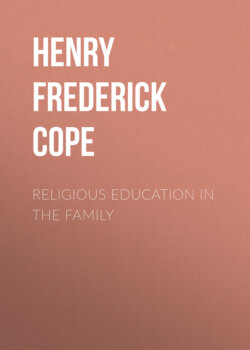Читать книгу Religious Education in the Family - Henry Frederick Cope - Страница 17
На сайте Литреса книга снята с продажи.
§ 6. THE HOME CHANGING; THE FAMILY ABIDING
ОглавлениеThe home is of importance only as a tool, a means to the final ends of the family life; the test of its efficiency is not whether it maintains traditional forms but whether it best serves the highest aims of family life. We may abandon all the older customs; our regret for them, as we look back on the days of home cooking, cannot be any greater than the regrets of our parents or grandparents looking back on the spinning-wheel and the hand loom that cumbered the kitchen of their childhood. Surely no one contends that family life has deteriorated, that human character is one whit the poorer, because we have discarded the family spinning-wheel. Through the changes of a developing civilization, as man has moved from the time when each one built his own house, worked with his own tools to make all his supplies, to these days of specialized service in community living, the home has changed with each step of industrial progress, but the family has remained practically unchanged.
The family stands a practically unchanging factor of personal qualities at the center of our civilization; the family rather than the home determines the character of the coming days. In its social relationships are rooted the things that are best in all our lives. In its social training lie the solutions of more problems in social adjustment and development than we are willing to admit. The family is the soil of society, central to all its problems and possibilities.
Before church or school the family stands potent for character. We are what we are, not by the ideals held before us for thirty minutes a week or once a month in a church, nor by the instructions given in the classroom; we are what parents, kin, and all the circumstances that have touched us daily and hourly for years have determined we should be.
The sweetest memories of our lives cluster about the scenes of family life. The rose-embowered cottage of the poet is not the only spot that claims affectionate gratitude; many look back to a city house wedged into its monotonous row. But, wherever it might be, if it sheltered love and held a shrine where the altar fires of family sacrifice burned, earth has no fairer or more sacred spot. The people rather than the place made it potent.
Stronger even than the memories that remain are the marks of habits, tendencies, tastes, and dispositions there acquired. Many a man who has left no fortune worth recording to his sons has left them something better, the aptitude for things good and honorable, the memory of a good name, and the heritage of a life that was worthy of honor. The personal life has been always the enduring thing. Our concern for the future should be not whether we can pass on intact the forms of home organization, but whether we can give to the next day the force of ideal family life. Perhaps like Mary we would do well to turn our eyes from the much serving, the mechanisms of the home, to set our minds on the better part, the personal values in the association of lives in the family.
